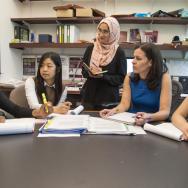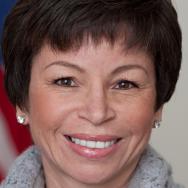Noise and protest are important parts of the #MeToo movement—but so is civility, Valerie Jarrett, a distinguished senior fellow at the University of Chicago Law School and a former senior adviser for President Barack Obama, told students at a Nov. 2 student-run symposium.
“Anger is completely justified because [survivors of sexual assault and harassment] have been violated, and there has been an abuse of power,” Jarrett said during an hourlong conversation with Prof. Emily Buss in a packed lunchtime session. “But tone matters. As we learn when we’re young, it is a lot easier to listen to somebody who isn’t screaming at you. It takes strength to take down the decibel. There is a time for a high decibel, but when you’re really working on an issue with people who are in positions to affect policy—and affect practice and affect culture—then we have to figure out how to have a conversation…that people can hear.”
Storytelling is a powerful way to accomplish that because it builds empathy, she said, adding that gathering to share ideas as real people—not just social media accounts—can be an essential part of finding common ground.
“Technology allows us to hide behind a veil of anonymity,” Jarrett said. “We don’t have to look into the faces of people we say terrible things about, you can just hit and run. That loosens up people’s behavior. When you sit and have a meal together—as we are today—it just changes the tone.”
The Q&A was the keynote session in a University of Chicago Legal Forum symposium, which convened scholars from across the country to examine the way law has shaped the burgeoning #MeToo movement by influencing cultural norms surrounding sexual harassment and assault, informing public discourse and media coverage, and spurring or even limiting reform efforts and institutional change.
“The #MeToo movement is in many ways a cultural reaction to an inadequate legal regime,” said law student Briana Goncalves, the symposium editor and an organizer of the event. “Because the movement has remained so salient in the public discourse, the Legal Forum felt it was necessary to bring the conversation to the training ground for the next generation of advocates and policy makers.”












 —Prof. Kunle Odunsi
—Prof. Kunle Odunsi
